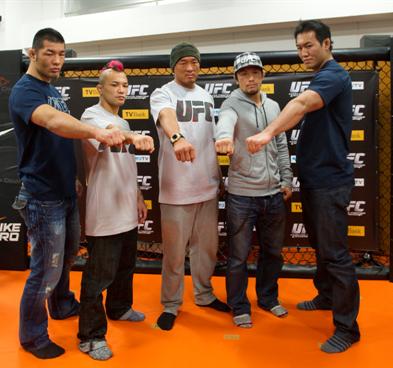
It’s been over ten years since the UFC held an event in Japan, one of the first countries to embrace mixed-discipline combat sports and the birthplace of PRIDE Fighting Championships. With PRIDE long gone and Japan’s interest in mixed martial arts seemingly waning based on TV numbers and financial reports, Zuffa still hasn’t given up on returning to the Land of the Rising Sun and continuing it’s global expansion.
On Monday the UFC held a press conference in Tokyo to announce a new media partnership with TV Bank and NTT Plala (Hikari TV) to get UFC content into Japan through mobile devices and online. It might seem like nothing more than good business news for the world’s biggest MMA promotion, but the UFC’s determination to expand its reach in Japan couldn’t come at a better time.
Already having financial troubles, PRIDE didn’t last long after news reports alleged that the promotion’s parent company had ties to organized crime. Along with Sengoku, FEG has since helped keep MMA going in Japan, but their own fiscal problems have left the future of their DREAM MMA brand and K-1 kickboxing products in doubt.
Some say competition is good for the sport, and it certainly benefits the fighters by providing a wider array of good financial opportunities. However, Sengoku, DREAM, and PRIDE before that also generate interest in the sport itself and tap into the deep talent pool of Japanese fighters.
As the UFC has grown, we’ve seen an explosion in the number of talented athletes in the U.S. pursuing MMA, and it stands to reason that Japan needs the continued presence of at least one popular fight brand for younger aspiring fighters to head to the gym and dedicate themselves to the art of fighting. If the UFC can finally get a foothold in Japan, it could help rejuvenate MMA in a country that was filling large arenas back when some American politicians sought to ban the sport outright.
“Along with our existing partnership with WOWOW, the two deals announced continue to expand our media partnerships and consumer reach,” UFC Executive Vice President and Managing Director of Asia Mark Fischer said in a Jan. 25 press release. “Furthermore, the UFC is clearly building momentum in Japan toward finally bringing a live UFC event here for the first time in over a decade.”
Symbolically, MMA wouldn’t really seem the same without a thriving Japanese market. Keep in mind, though, that Japan’s active participation on the business side not only has financial consequences, but also consequences for MMA’s ability to grow as a sport and feature the most talented fighters in the world. Whether you look to UFC middleweight contender Yushin Okami, DREAM submission phenom Shinya Aoki, or recent UFC signees Norifumi “Kid” Yamamoto and Michihiro Omigawa, the sport would look quite different without a high level of participation in Japan.

[…] This post was mentioned on Twitter by Travis Walker, MMAFightForce. MMAFightForce said: @mmafightforce UFC’s effort to breakthrough in Japan taking on added importance: With one of… http://goo.gl/fb/AOJN7 […]